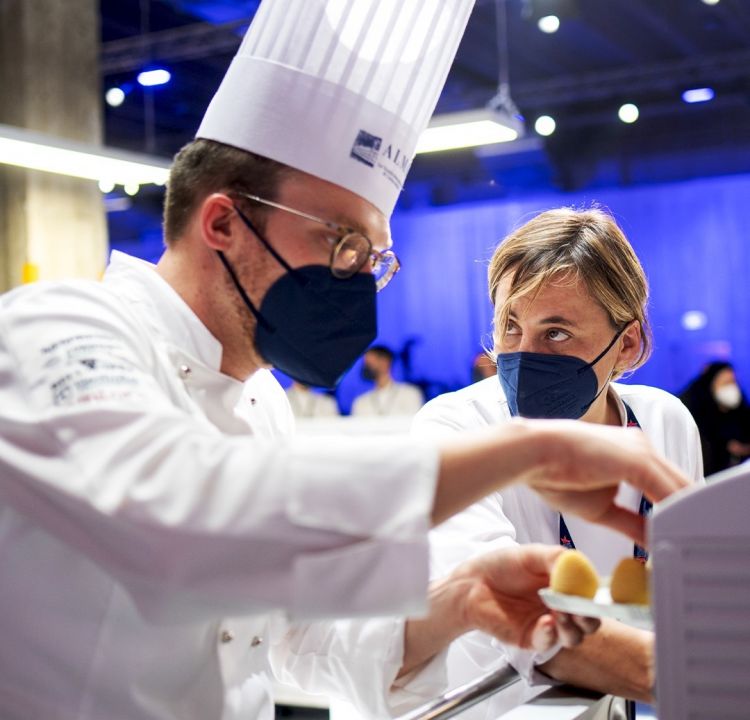The news is from Saturday 31st: the 2021 edition of the S.Pellegrino Young Chef Academy was won by Jerome Ianmark Calayag, Swedish chef originally from the Philippines. The close second place was won by Alessandro Bergamo, from Monza, at work at restaurant Cracco in Galleria, in Milan.
«I'm very happy with my performance», the young chef told Identità Golose right after the ceremony, «I showed that you can make an excellent dish with simple products. I'd like to thank Antonia Klugmann, with whom I worked very well. She helped me a lot. I could count on her in every moment».
The mentor and pupil, teacher and learner dynamic is perhaps one of the most fascinating in the competition. Soon before the edition was launched, we had asked the teacher and her pupil about their joint experience and the possibility of conveying knowledge in the kitchen. Some interesting ideas emerged.
How did your collaboration develop?
Klugmann: I had first tasted Better an egg today or a hen tomorrow, Alessandro's dish, two years ago, when colleague Riccardo Camanini passed me the baton of mentor – he had supported him until that moment. At the time I was in the jury and I loved the dish. It was very interesting from the beginning. From there we wondered how it could further evolve.
Bergamo: It's been a privilege and an honour to have Antonia by my side. Her experience, her palate and savoir faire made me feel at ease from the start and supported. In the end, it was like working next to a chef in a real kitchen: unless you have a point of reference, the restaurant can't go on.
Klugmann: I made it immediately clear that the dish was his and that in no way we had to change it so it would be closer to me. I believe that, if there's a feature that a young cook must acquire, it's the courage of having his own point of view, which is the most difficult task. It's the personal style of the chef that makes the difference. Alessandro immediately showed he's very serious, he focused in a very mature way on the goal. His dish had an incredible evolution, in terms of aesthetic cleanliness and technique, especially in his research of meat and of jus.
Bergamo: I'm thankful to Antonia because she never squashed my idea, she left me free to express myself, gave me useful tricks that can be passed on. Two very important elements.

: I tormented him most of all in terms of motivational leverages. I tried to work to enhance his features, to stimulate him before the competition, without ever imposing myself. Even at
L'Argine I never tell my team: ‘you should do this and this’. I'm not interested in creating copies of myself; instead, I invite them to find stimuli that will allow them to question themselves. I try to urge them to think.
What feature struck you the most of your partner?
Bergamo: Her frankness, her great direct impact. Antonia always tells you what she thinks. What works and what doesn't. I knew she was open and available. Then I met a person who enjoys the good in every aspect, a professional who constantly thinks that cooking must have a logic meaning, a precise idea.
Klugmann: Alessandro is very serious and meticulous. I believe he was the only contestant who brought everything, from the food warmer to the dustbin, ergonomic with respects to his station. He calculated everything, nothing was left to chance.
Is teaching made of giving silent examples or of talking?
Klugmann: When I was in high school or at university I knew teaching is conveyed through words. Cooking, instead, belongs to that artisanal context that makes it more similar to sports: some knowledge derives from learning the theory – you must always study what is going on around the world, or you will be restrained by your small surrounding and by limited views – but there's also a rhythm connected with manual learning, which is a process whose slowness must be respected. I always tell my team: ‘It doesn't matter if you've made a mistake, the process to become a cook is still very long'.
Bergamo: I've had many teachers. But it was my dad and mum who contributed in making me the person I am – humble, kind and well-mannered, I hope. Through words and examples. The same method I learnt from my current teacher, Carlo Cracco, a chef with infinite wisdom.
Do cooks still want to teach?
Klugmann: Perhaps less than they used to. I believe there is most of all a gift, and you can reach it only with a certain degree of maturity. Even in my case, 10 years ago, I was a very different teacher compared to today: at the time we were only 2, we're now 16. At the same time, I had endless things to think about, today I have more time to think about this. However, even when I couldn't afford it, I knew I had a vocation for teaching, I knew it was important. Today I think a crucial requisite in teaching is to be able to listen to those in front of you. Reciprocal knowledge is necessary to convey knowledge. And this becomes excellence only through effort, work, and sacrifice. There are no exceptions.
Alessandro, what is your dream for the next few years?
Bergamo: I want to reach a work and life balance. I dream of having a restaurant in which I can express myself, and a family I can count on. Two elements that are not banal at all.
Translated into English by Slawka G. Scarso